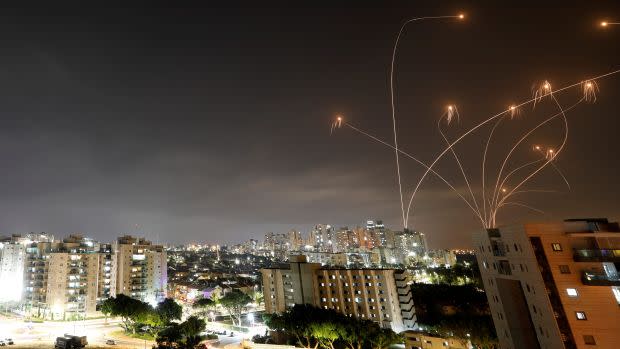The global conflicts that pre-dated Covid are now back in full force
- Oops!Something went wrong.Please try again later.

This time last year, the internet was awash with joyful videos of animals reclaiming the streets that humans had deserted in lockdown. Many of them turned out to be fake, but they went viral because they symbolized the possibility that maybe, just maybe, after this is over, we would have a less destructive relationship with our natural environment.
There are plenty of other problems we hoped the pandemic would magically fix—like the global conflicts that have simmered beneath the surface, erupting at times in violent ways, for decades.
Did global conflicts decline during the pandemic?
On March 23, 2020, UN secretary general Antonio Guterres called for a global ceasefire in the face of Covid-19. “It is time to put armed conflict on lockdown and focus together on the true fight of our lives,” he said. Of course, that’s not what happened, with current tensions in Gaza and Israel offering a stark reminder of that reality, alongside violence in Myanmar, Colombia, and Afghanistan.
The nonprofit Armed Conflict Location & Event Data Project (ACLED)’s tracker shows that “conflict events declined [in 2020] on aggregate compared to 2019, but political violence increased in more countries than it decreased, and most wars continued to rage.” ACLED also recorded an increase in political demonstrations globally, “not just despite—but in part because of—the pandemic.”
One reason why it may have felt like global conflicts lessened during the pandemic is that there were fewer journalists on the ground to cover them, and fewer people in the streets to spread awareness about them on social media.
Now, more than 15 months since the World Health Organization declared the coronavirus “a public health emergency of international concern,” it certainly feels like whatever temporary slowdown in conflicts the pandemic may have caused in some places is well and truly over. Below is a non-exhaustive list of resurgent conflicts around the world.
What is happening in Israel and Palestine?
Palestinians and Israeli police have been clashing since the start of Ramadan after Israel imposed restrictions on where Muslim worshippers could gather near the Western Wall and the Al-Aqsa mosque. There were also widespread protests tied to Israel’s decision to forcefully evict Palestinian families living on land in east Jerusalem that Jewish settlers say belonged to them before the 1948 Arab-Israeli war.
Israeli soldiers have been at a standoff with Palestinians all week at the mosque. After the soldiers continued to hem in Al-Aqsa, Hamas began launching rockets into Israel from the Gaza Strip. Now, Israel is responding with airstrikes. But the violence is not evenly matched: Israel’s Iron Dome air defense system is able to intercept most rockets, while civilians in Gaza have no such defense. Dozens are reported to have died, including children. Most were Palestinians.
What is happening in Colombia?
State forces have clashed with anti-government demonstrators for weeks as frustrations with a proposed tax hike boil over into generalized discontent with Colombian president Ivan Duque.
The violence worsened this week, with human rights bodies accusing the army (the ejército nacional de Colombia) of a disproportionate use of force. Forty people are reported to have died so far, all but one of them protesters. A notable death was that of student activist Lucas Villa, who was reportedly shot eight times by gunmen on motorcycles at a peaceful protest.
What is happening in Afghanistan?
The US and its allies have been waging war in Afghanistan for nearly 20 years. US president Joe Biden recently said he would bring all American troops in the country home by Sep. 2021. Critics say this leaves an unstable Afghanistan exposed to violence from the Taliban, ISIS, and other extremist groups.
In the latest example of this, 85 people, most of them young girls from poor families, were killed in a school bombing in Kabul last week. A further 147 people were injured by the explosion. The government blamed the Taliban, who denied any involvement.
Sign up for the Quartz Daily Brief, our free daily newsletter with the world’s most important and interesting news.
More stories from Quartz:
Indian techies have found workarounds to the government’s inefficient vaccine booking system
“Nobody is understanding the challenges of supplying oxygen to a nation that is at war”
